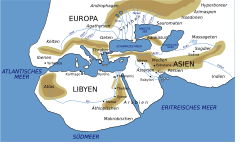Xerxes Cuneiform Van
In Old Persian, Babylonian and Elamite, it says (roughly):
"Ahuramazda is the great god, the greatest god who created the sky and created the land and created humans Who gave prosperity to the humans Who made Xerxes king King of many kings, being the only ruler of the totality of all lands
“I am Xerxes, the great king, the king of kings, the king of the lands, king of all the languages, king of the great and large land, the son of king Darius the Achaemenian”
The king Xerxes says: “the king Darius, my father, praised be Ahuramazda, made a lot of good, and this mountain, he ordered to work its cliff and he wrote nothing on it so, me, I ordered to write here.
May Ahuramazda protect me, with all the gods
and so my kingdom and what I have done."Relevante Bilder
Relevante Artikel
Xerxes I.Xerxes I. war ein persischer Herrscher. Er regierte von 486 bis 465 v. Chr. als achämenidischer Großkönig und ägyptischer Pharao. Sein Name bedeutet „Über Helden herrschend“. .. weiterlesen
HerodotHerodot von Halikarnass(os) (altgriechisch Ἡρόδοτος Hēródotos; * 490/480 v. Chr.; † um 430/420 v. Chr.) war ein antiker griechischer Geschichtsschreiber, Geograph und Völkerkundler. Cicero verlieh ihm in seinem philosophischen Werk De legibus den bis heute oft zitierten Beinamen „Vater der Geschichtsschreibung“ (lateinisch pater historiae). Sein überliefertes Werk sind die wohl im 2. Jahrhundert v. Chr. in neun Bücher unterteilten Historien, die in Form einer Universalgeschichte den Aufstieg des Perserreichs im späten 6. Jahrhundert v. Chr. und die Perserkriege im frühen 5. Jahrhundert v. Chr. schildern. .. weiterlesen










